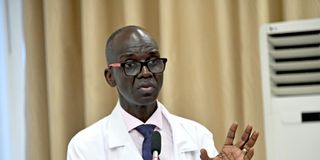Prime
Prof Janabi: Why I am the right man to lead WHO Africa Region

Prof Mohammed Janabi
What you need to know:
- Prof Janab managed to reduce overseas medical referrals by 95 percent, saving Tanzania over $10 million annually, which he redirected to Primary Health Care
Dar es Salaam. Tanzania’s candidate for the position of World Health Organisation (WHO) Regional Director for Africa on Wednesday, 2 April 2025, outlined why he is the best choice for the role.
Speaking during a live candidates’ forum for the WHO Regional Director for Africa, Prof Mohamed Janabi, who is competing against four other contenders, highlighted his key achievements in Tanzania and set out seven priorities he would focus on if elected. During the question-and-answer session, he detailed his five-year vision for the role.
Detailing his personal experiences and accomplishments, Prof Janabi said that as the first CEO of the Jakaya Kikwete Cardiac Institute (JKCI) in 2024, he reduced overseas medical referrals by 95 percent, saving Tanzania over $10 million annually.
These funds, he said, were redirected towards strengthening Primary Health Care (PHC), benefiting those unable to afford hospital treatment.
This, he said, was achieved by building in-house human capacity, improving infrastructure, advocating for increased health budgets, engaging the private sector and fostering global collaborations. The JKCI, he said, has since become a regional hub, performing over 4,000 interventional procedures and open-heart surgeries annually, including pacemaker implants and bypass surgeries, assisting patients from across Africa.
In 2022, he was appointed CEO of Muhimbili National Hospital (MNH), one of the region’s largest hospitals, with over 2,400 beds and more than 4,000 staff members. The hospital serves an average of 3,000 patients daily.
“Furthermore, I oversee an outreach network of 12,200 satellite healthcare facilities across the country through telemedicine, e-medicine and artificial intelligence. Our plan is to train 137,000 community health workers by 2030 to act as a bridge between communities and the formal healthcare system,” he said. Under his leadership, Prof Janabi said, MNH secured $363 million in 2025 from a non-traditional financier, the Republic of South Korea, for health system strengthening. The funds were provided on favourable terms, with an interest rate of 0.01 percent, a grace period of 15 years and a repayment period of 25 years.
“This innovative financing will transform Muhimbili and its satellite health facilities into a regional hub for preventive, protective, curative and rehabilitative services,” he said.
If elected, he pledged to engage similar non-traditional funders from Africa and beyond.
Research and advocacy
In the early 2000s, Prof Janabi co-investigated HIV trials between Tanzania and Mozambique. His work in 2012 led to then-President Jakaya Kikwete publicly undergoing an HIV test, which helped remove stigma and inspired five million Tanzanians to seek counselling and testing.
A similar scenario unfolded in 2021 when President Samia Suluhu Hassan openly championed Covid-19 vaccinations, significantly increasing vaccine uptake and curbing misinformation. Prof Janabi also recalled a 2015 scenario which followed the Ebola outbreak in West Africa.
At that time, the UN Secretary-General Ban Ki-moon appointed President Kikwete to lead a UN High-Level Panel on Global Health Crises. As a senior advisor, Prof Janabi personally visited affected areas in Liberia, Guinea and Sierra Leone, gaining invaluable hands-on experience.
“The panel’s recommendations led to the WHO’s current approach to managing emergency crises,” said Prof Janabi.
He stressed that Africa’s youthful population presents both opportunities and challenges. “While young populations drive growth and innovation, they are also vulnerable to risks such as substance abuse, unprotected sex, teenage pregnancies, and mental health disorders,” he said.
At the same time, he highlighted the need to prepare the healthcare system to cater to an ageing population. He also highlighted his seven key priorities which include a Universal Health Coverage (UHC) that aligns with Sustainable Development Goals (SDGs) for which he said Africa must address its lagging UHC implementation.
His second priority was sustainable financing whereby he noted that member states contribute only 20 percent of WHO’s budget.
Such a scenario prevented the organisation’s autonomy and that it was on such a note that he supports increasing assessed contributions and diversifying funding sources through health insurance schemes, public-private partnerships, blended financing, debt-for-health swaps, and global debt cancellation.
His third priority was on health emergency preparedness which he said would see him strengthening the health workforce, improving disease surveillance, enhancing rapid response mechanisms, and promoting cross-border cooperation. On Maternal and Child Health and Nutrition, Prof Janabi said Africa accounts for 70 percent of maternal deaths and 56 percent of under-five deaths worldwide.
However, Tanzania reduced maternal mortality by 80 percent between 2015 and 2022, an achievement recognised when President Samia Suluhu Hassan received the Global Goalkeeper Award from the Gates Foundation in 2024.
Prof Janabi said he would also work to combating communicable, non-communicable, and neglected tropical diseases by implementing robust disease control strategies, promoting healthy lifestyles and recognising the interconnectedness of humans, animals, plants, and ecosystems.
The sixth priority he highlighted was that of tackling antimicrobial resistance which causes 1.2 million deaths annually, yet 40 percent of African nations lack surveillance data. He pledged to establish regional databases to combat the crisis.
The seventh priority on Prof Janabi’s plan is that of enhancing local manufacturing capacity. He said the Covid-19 exposed Africa’s heavy reliance on imports for diagnostics, therapeutics and vaccines, with over 99 percent of public health products being imported.
He aims to boost local production by engaging non-traditional partners, including the African diaspora, to contribute expertise, training, and mentorship.
“I will leverage health diplomacy to strengthen health system partnerships and elevate African leadership in global health,” he said.
In his five-year plan, he aims to make Africa self-sufficient through domestic financing innovations and lift 4.5 million people out of poverty.





